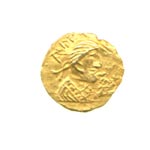January 20, 640: Death of King Eadbald of Kent
 King Eadbald (616-40) was the son of King Æthelberht of Kent (580s-616), who received Augustine from Rome in 597 and had been converted to Christianity by 601, when Pope Gregory the Great sent the king a letter of congratulations (preserved in Bede, Ecclesiastical History, i.32). In another letter, Gregory claims that by Christmas 597 over ten thousand English people had been baptized.
King Eadbald (616-40) was the son of King Æthelberht of Kent (580s-616), who received Augustine from Rome in 597 and had been converted to Christianity by 601, when Pope Gregory the Great sent the king a letter of congratulations (preserved in Bede, Ecclesiastical History, i.32). In another letter, Gregory claims that by Christmas 597 over ten thousand English people had been baptized.
However, Æthelberht's son Eadbald was not one of them, and after Æthelberht's death in 616 Bede reports that the accession of a heathen king allowed wavering converts to renounce Christianity and go back to heathen practices. Several of the Roman missionaries decided to go back to their own country rather than stay on in this newly-heathen land. Bede tells that Laurence, Augustine's successor as archbishop of Canterbury, was about to leave, when he had a dream that St Peter appeared to him and scourged him and exhorted him to stay. The next day Laurence went to the king, showed him the marks of his beating, and Eadbald was sore afraid. So much so that he banned heathenism, was baptized, and afterwards promoted the Christian church as well as he could.
Or that's the story as Bede tells it. Bede is, of course, a Christian monk enforcing a party line, and we may suspect that Eadbald was motivated by more pragmatic concerns (like alliance with the Christian Franks) that Bede either did not know or thought less important than telling a good Christian miracle story. Even in Bede's own account there's an inconsistency, because in a later letter Pope Boniface (619-25) seems to credit Laurence's successor Justus with Eadbald's conversion. It is plausible that the "scourging" by St Peter was a legendary development of a strongly-worded letter from St Peter's successor, Pope Deusdedit (615-8) -- after all, when Augustine asked leave to turn back from heathen England in 596, Pope Gregory refused (July 23, 596), and the situation in 616 was no worse.
The only concrete evidence we have from Eadbald's reign is a handful of gold coins which have survived, bearing the king's head, facing right, and a legend (usually incomplete and with variants) like + AVDVARLD REGES (Eadbald King). Gold coins made in England were just appearing at the start of the 600s (they would be replaced by silver in the 670s and 680s), but almost all of the early issues were anonymous. The coins in Eadbald's name are exceptional, but without a context they remain as puzzling as the true story behind his conversion.